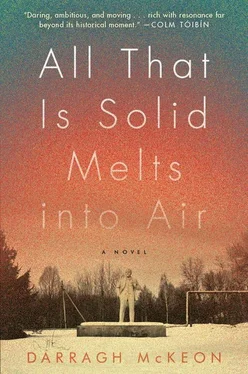THEY WERE FRIENDS immediately. They spoke their first words to each other as they stood in line in the reception yard of the military base, while the attending sergeant shouted to all the newly disembarked recruits through a megaphone. They looked like all the others. They wore rags, just as their cousins and neighbours had told them to, knowing their clothes would be pitched away in a matter of hours, replaced by sharply pressed fatigues. Some men, the kolkhoz boys with their hoary, farm-worn fingers, had traces of cow shit on theirs. Others were wearing woolen sweaters they had long outgrown, the material stretched across the camber of their overdeveloped chests.
The sergeants had boarded the buses and welcomed the men cordially, then screamed at them to get in formation behind the painted lines in the yard. Even though they had all been warned about this transformation, to see it in action was an incredible sight, a man switching effortlessly and immediately from a warm, friendly demeanour to a demonic intensity.
After Grigory and Vasily had collected their uniforms and boots, they were posted together in the same barracks, where they eventually alighted upon the subject of medical school, a link between them that was both a surprise and a consolation, and later, when they realized they were both from Kostroma, their friendship was cemented.
There were many times during those months that Grigory suspected his lungs might explode from the intensity of the running. Times when his muscles couldn’t lift his body to a full push-up position, hours when a small stone would scurry its way inside his boot and lie there, at the bottom of each stride, until his foot swelled up and it took all his strength not to scream with the intensity of the pain.
Bodies were pushed in other ways; beatings were handed out, often in front of the whole battalion. A sergeant would pull someone from ranks, not even inventing a reason for his ire, and beat a man unconscious. It was not the sight of this that Grigory found disturbing—the men accepted their pummelings without complaint, so the sight lacked any pained drama. Even the officers, it was apparent, didn’t have any particular taste for what they were doing. They had to work themselves into the fury. And afterwards they walked away, no desire in them to bask in their positions of total dominance—it was the sound. The dull, weighty impact of flesh meeting flesh. He could still bring it to mind, years later, watching little girls playing their clapping games or listening to a barber apply alcohol to a freshly shaven face.
And still they ran, and swung and climbed and leaped.
So many of them talked to themselves. So many times Grigory had watched a man on the brink of collapse and witnessed a full and involved conversation being played out through the twitching of their lips, the physical battle taking on a dialogue of its own. He knew he did the same, in his own moments of desperation. A few cried uncontrollably. Others shut down completely, unable to focus their pupils upon whatever was placed in front of them. When a man was gripped with this kind of torpor, he was treated as though mentally diseased. Within a few days his mattress would be stolen and he would find himself sleeping in the corner of the dirt floor, swept there like the cigarette butts and the mashed leaves or bits of grass that were brought in by weary feet at dusk. If the recruit was unlucky enough to have his bunk within the small radius of heat given out by the stove in each cabin, he might only be allowed one night of weakness. In such cases their nights would be spent lying in the corner until they cut themselves off completely from their billeting and ended up outside the barracks, frozen to death against the mess hall or hanging off the beams of the watertower, or from the sturdy boughs of the ash tree that stood at the entrance to the expanse of mud that was their recreation yard. The kolkhoz boys called them “crows.” When Grigory asked why, they told him that at home they never used scarecrows to ward off threats to their harvest, they shot offending crows and tied them to poles, which they implanted throughout the crops. Once they did this, there were never any more problems.
Near the end of their training they were stationed in the Troitsko-Pechorsky region of Komi. It was late March and the land was still deep in snow. Their platoon was camped in a forest, performing tactical manoeuvres. They had been in colder conditions, but they were more tired than before. Each man had prominent cheekbones and swollen joints. Throughout the months, their will ebbed and flowed, there were periods of time when they could feel themselves growing harder, stronger, feel their bodies adapting to the demands being placed upon them. But they were at the end of that process, two weeks away from their leave, and they thought of nothing but rest and warmth. They wanted to be in a bed with Natalya or Nina, Irina or Dasha, Olga or Sveta.
They had dug into an ambush position waiting for a rival platoon to make its way into their lair and were under strict orders to keep movements to a minimum by order of their lieutenant, Bykov, a young, shrewd leader whose front teeth were missing, a trait which would have looked comical in other men, but in Bykov’s case it seemed to demand more respect.
Sunlight twirled through the trees with the passing hours, frost blew in glassy sprays. A family of snow foxes lived about twenty metres north of their position and they became fascinating to the listless men; a set of binoculars would be passed around and they’d watch the cubs playing with each other, wrestling and leaping—enchanted by the distinct character of each animal—until their rations wore thin and they set out snares and caught and skinned them for food.
At night, they wore white sheets around their greatcoats, taken from a nearby village, for camouflage, and smoked in their foxholes and talked in hushed tones and improvised chess sets from cigarette packets and rationing tins and pebbles.
The lieutenant sent out regular patrols in anticipation of the progress of their rivals. Grigory and Vasily operated on different shifts, but one night Vasily’s partner was struck down with bronchial coughing, and the lieutenant told Vasily to choose his partner, and he did, and the two men walked uphill through the trees, rifles ready, crunching gently through fresh snow. It took only five minutes of walking for the men to feel abandoned. Looking back to their encampment, there were no traces of life: even their footprints had lost definition and softened into a series of small, almost unrelated, indentations. They checked their maps once more and made certain of their grid references. Getting lost wouldn’t be a total disaster as they knew the area well enough to find their bearings by daylight, but the embarrassment would follow them for the rest of their training: every comment from rifleman to cook would contain some kind of reference to their ineptitude. So they agreed on their position and buttoned their compasses into their breast pockets. Then, as instructed, they split up, approaching the crest of the hill from opposite sides, maximizing the range of their watch.
Grigory walked alone, peering into the night. A concentrated stillness all around. When he paused and listened, he could hear only the boughs of the pine trees adjusting themselves, nodding in repose.
He put some more distance between himself and the camp, then pulled out a cigarette and stepped out of the moonlight and lit up. He was careful to cup his hands around the tip, shielding what little light it gave off, and held the butt between his index finger and thumb. Bringing it deftly to his lips, he dragged deeply at the tobacco. It was good to be out here, to feel the sharp night air and stretch his legs, to do anything other than wait in a hole in the ground. He knew they were almost at the end. Lieutenant Bykov was beginning to get edgy, he couldn’t justify staying put much longer, no matter how strategically smart their position. It was, after all, a training manoeuvre and perhaps the opposing side had already achieved their objective. Maybe they were all freezing their arses off while their comrades were partying a few kilometres away, drinking and packing their cases for home.
Читать дальше












